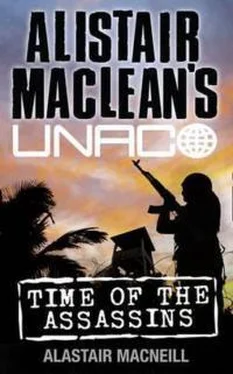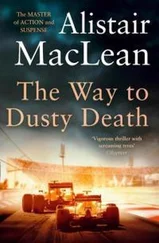‘And possibly kill himself in the process.’
Kolchinsky reached for his cigarettes and lit one. ‘That’s why the Secretary-General’s delaying his decision. He’ll give the Colonel every chance to prove that he’s fit enough to return to work.’
‘And if not, I’ll leave Strike Force Three and join you here.’
‘You don’t sound very enthusiastic about it,’ Kolchinsky said.
‘I’m not. Stuck behind a desk all day isn’t my idea of fun, Sergei.’ Whitlock picked up the dossier. ‘Let me out, will you?’
‘The Colonel said you were over the moon when he broke the news to you.’
‘How did you expect me to react? Carmen was there.’ Whitlock walked to the door and looked back at Kolchinsky. ‘Don’t worry, I won’t let anyone down. Especially not her.’
Remy Mobuto had always lived in his brother’s shadow. He had known from an early age that Jamel, as the older brother, would take over as leader of Zimbala once their father died. That had never bothered him. He had never had any aspirations to enter politics. When he followed Jamel to Oxford he immediately joined the Communist Party, more as an act of rebellion than anything else. His father’s response was not only to stop sending him money but also to bar him from returning to Zimbala until he renounced his Socialist beliefs. He refused to comply and left Oxford after the first year to join the Guardian where he remained for seven years before taking up a post as an investigative journalist with a left-wing French newspaper. By then he had become an outspoken critic of the numerous dictators in Africa, especially his father. His father disowned him publicly and said he would never be allowed back to Zimbala in his lifetime.
He returned for his father’s funeral, the first time he’d been back to Zimbala in seventeen years, and Jamel was able to persuade him to stay on as the new editor of the country’s leading daily newspaper, La Voix .
Remy had only been in charge for a month and already he had a major scoop on his hands. It concerned the plot to overthrow his brother and form a new dictatorship; but he had discovered another side to the story, a sinister angle that would make international headlines if it were ever made public. But before he could do that, or tell Jamel, he needed proof to back up those allegations. And he was about to get it…
He drove down the main street of Habane, the capital of Zimbala, and turned into the basement carpark where he had arranged to meet his informant. There were only a couple of cars there at that time of the evening. He glanced at his watch. Eight fifty-seven. He had told his informant to meet him at nine o’clock.
He pulled into the pre-arranged space, climbed out of the car, then took a pack of cigarettes from his jacket pocket and lit one. He looked around him slowly. The silence was eerie. He took a long drag on the cigarette and looked at his watch again. Eight fifty-eight. He cursed his anxiety. There was no reason for it. But still the uncertainty lingered. He looked round again, this time taking more notice of his surroundings. Then he saw it: his informant’s car, a blue Fiat. It was parked next to the wall and almost hidden from view by the red Studebaker beside it. He exhaled sharply and managed a faint smile. Typical of his informant to take such precautions.
He ground his cigarette underfoot and walked slowly towards the Fiat. He could see his informant behind the wheel. Why hadn’t he shown himself?
Mobuto dismissed the question; at least he was there. He reached the Fiat and leaned over to peer through the driver’s window. The man’s throat had been cut from ear to ear, soaking his shirt and trousers in blood. Mobuto recoiled in horror, stumbling back painfully into the Studebaker’s wing mirror. He felt his stomach heave and he retched against the wall. He remained doubled over for several seconds before slowly straightening up and wiping the sweat from his forehead.
Then he heard a sound behind him. He turned, his eyes wide with fear. Two men stood behind the Studebaker. Both were dressed in blue overalls. One had blood on his sleeve. The killer? He was about to speak when he noticed a movement out of the corner of his eye. He was still turning when the cosh struck him behind the ear.
Then nothing.
Zimbala’s main prison, La Tambier, was less than ten minutes’ drive from the centre of Habane. It took its name from the district in which it was located. It had been built when Alphonse Mobuto first came to power and quickly became known throughout the country as La Boucherie, the Butcher’s Shop, because of the number of anti-government dissidents who were tortured then murdered there by the feared and hated Security Police. Jamel Mobuto’s first two decrees on taking office had been to free all political prisoners being held there and the immediate dismantling of the Security Police. Now, ironically, its most notorious prisoner was Le Boucher, Tito Ngune, the head of the Security Police for the last twenty-three years. There had been cries for his public execution but Jamel Mobuto had made it quite clear that Ngune would be tried and, if found guilty, sentenced to life imprisonment. He refused to continue the legacy of executions which had been symptomatic of his father’s regime.
Ngune lay on the single mattress in the corner of his cell. He was a stocky fifty-eight-year-old with grey hair and a small goatee beard which looked as if it had been stuck on to his chin with glue. His face and body were a mass of bruises after he had been attacked at his home by a forty-strong mob who were preparing to lynch him in the remains of his once beautiful garden when the military had arrived and bundled him into the back of a police van and brought him to La Tambier.
He sat up gingerly and looked slowly around the cell. All those years of unswerving loyalty to Alphonse Mobuto and this was all it had brought him. Mobuto had always had one weakness, his family. Although he publicly renounced Remy and repealed the law making Jamel his natural successor, he had always refused to allow Ngune’s men to touch them. But, unknown to Mobuto, Ngune had tried on three different occasions to have Jamel killed. Each attempt had ended in failure. He certainly had guts, Ngune had to give him that. Anyone else who had dared to criticize either Mobuto or his Government was immediately arrested and taken to La Tambier or to the now abandoned Branco prison in Kondese, the second-largest city situated in the south of the country. None of them ever left.
A jackhammer started up somewhere beyond the prison walls. It had become a familiar sound over the last couple of days. At first it had been an irritation but now he had grown strangely accustomed to it – a break from the monotonous silence that filled the prison. He had wondered what they were doing out there. Digging up the road? Or tearing down part of the prison? It was certainly feasible under Jamel Mobuto’s new liberal leadership. Not that it mattered. It was all academic to him now. But it still interested him, if only to put his mind at rest. He reminded himself to ask one of the guards when they brought him his next meal…
Michael Sibele had known for the last two days why the gang of workmen was busy outside the main gates: repairing a burst mains pipe. He had been the guard on duty at the gate for the last week. It was his last day. Tomorrow he would return to his duties inside the prison – with mixed feelings. He had enjoyed the workmen’s company but he would also be grateful to get away from the noise of the machines, especially the incessant throbbing of the jackhammers. The workmen had offered him ear plugs but his commanding officer had forbidden him to wear them. So he just had to put up with the noise. Well, only a few hours to go…
Читать дальше












